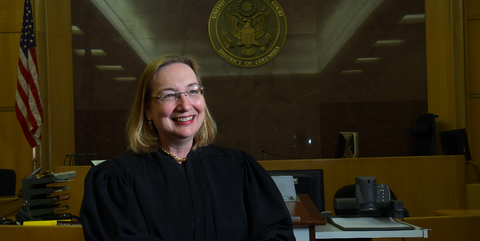This Is Christmas in September for People Who Don't Think Money Should Completely Rule Our Politics
I am not optimistic about the future, but this was a nice moment.

Getty Images
Something very interesting happened at the Supreme Court itself while all the wide world was enthralled with the saga of the guy nominated to be its ninth member for the next several decades. In August, a federal district judge named Beryl Howell ruled that nonprofit groups placing political advertisements have to reveal the identities of anyone who gave them more than $200. Last Saturday, Chief Justice John Roberts jumped in with an order that blocked this ruling. Then on Wednesday, the Court itself refused to agree with Roberts and refused to block Judge Howell's order. From The New York Times:
The case was brought by Citizens for Responsibility and Ethics in Washington, or CREW, a watchdog group. It sued the Federal Election Commission and Crossroads GPS, a conservative group. Judge Howell struck down a federal regulation that had effectively allowed secret contributions, saying it conflicted with a federal statute. A federal appeals court will hear an appeal of Judge Howell's ruling, but no decision is expected until after the elections in November. That means many groups placing campaign advertisements will have to disclose their donors in the meantime.
Crossroads GPS happens to be Karl Rove's outfit, so that makes this a decision that has campaign-finance reformers turning handsprings.
The ruling applies to groups like social welfare and business organizations that do not register as political committees with the election commission. The commission had required disclosure of donors only when they contributed money for specific advertisements. That allowed them to evade statutory disclosure requirements, Judge Howell wrote. "A donor contributing over $200 during a calendar year to a not-political committee for the express purpose of advocating for or against the election of a candidate for federal office, would nonetheless not be identified," she wrote, "absent the donor's express agreement that the funds be used for the specific expenditures reported to the F.E.C., even though the donor may otherwise support and in fact contribute for the purpose of funding those expenditures."
That is Christmas in September for those embattled souls who have been trying to make sense of how to do politics in an era in which the Supreme Court's Citizens United decision essentially legalized anonymous influence-peddling. There will be an appeal but, at least through this November's midterms, these completely phony "public-service organizations"—"Public service" in this case being defined as informing the public that your opponent is a Communist baby-killing liberal fascist who wants to steal your firearms and give you a gay-marriage abortion—will have to cough up the names of the peddlers of influence that are financing them. That this also will apply to liberal groups doesn't matter a damn, not to me, either.
What matters is that, in this case at least, there seems to have been a faction on the Court that is willing to be flexible on dark money, and that's willing to overrule the Chief on the subject, too. Of course, it's a 4-4 court right now. I am not optimistic about the future, but this was a nice moment.




No comments:
Post a Comment